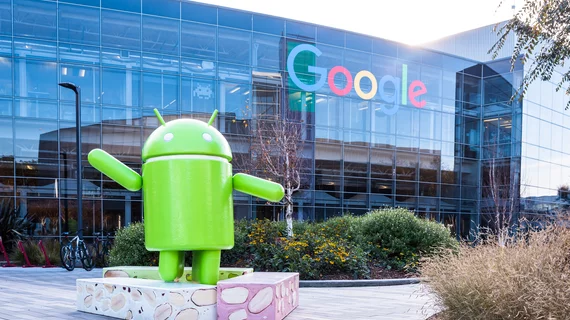Industry Watcher’s Digest
Buzzworthy developments of the past few days.
- You’ve heard it before and you’ll hear it again: Healthcare AI can free up clinicians to concentrate on patient care. An academic physician who founded a healthcare AI startup gives the promise a new fleshing-out in an interview posted online May 30. “You want doctors to do what they’re meant to do—provide care—and let technology handle the administrative aspects,” Michael Gao, MD, tells Pymnts.com. Gao left his work in internal medicine and healthcare innovation at Weill Cornell Medicine in 2020 to launch SmarterDx. The company supplies AI-equipped software to hospitals interested in improving revenue integrity. SmarterDx made news earlier this month when it closed a $50 million funding round. The interview is conducted by Pymnts’s chief content officer, John Gaffney. It runs 17 minutes and is worth a watch.
- Can you name three things AI can do to improve clinical care? Let Chenyang Lu, PhD, help you. The Washington University professor of engineering and applied science is partial to AI’s ability to help 1) unobtrusively screen for depression, 2) tirelessly monitor cancer patients for deterioration and 3) accurately predict surgery patients’ risk for post-op complications. In a conversation with HIMSS Media, Lu reminds fellow AI enthusiasts that “We are still at the early stage of AI in healthcare. Looking forward, it is imperative to lower the hurdles for implementing AI models in our infrastructure.” Read the rest.
- The healthcare AI market was valued at more than $11 billion in 2021. That estimate impressed a lot of people when it first came out. Then came investment analysts forecasting the market valuation will soon dwarf that sum, reaching $164 billion by 2029. The physician-writer Arjun V.K. Sharma, MD, makes prosaic note of the projection by way of offering poetic perspective on what it all means. “I often think about what gives meaning to the help we offer patients, how that might be shaped by the precision and calculations of a looming revolution from a novel technology,” he writes in a genuinely lovely piece published by Undark. “How do messy human problems fit into a future of healthcare that strives to be so tidily packaged, helmed by the algorithms of artificial intelligence that many are so eager to adopt?”
- In an AI hospital, virtual doctors treat virtual patients. It’s a real thing in China. At one such institution, human physicians and trainees work with gen AI-simulated patients too, improving their skills alongside their AI counterparts doing the same. The AI doctors can treat 10,000 patients in just a few days, reports the Global Times, a daily tabloid newspaper published by the Chinese Communist Party. The outlet notes that the AI hospital’s “evolved doctor agents” topped 93% accuracy on a U.S. Medical Licensing Exam covering major respiratory diseases. “We cannot deny that AI healthcare can surpass human physiological and intellectual limits in certain aspects, enhancing the precision and efficiency of healthcare services,” the article states. “However, one thing is certain: AI can never replace humans.” Well that’s a relief. Read the whole thing.
- In theory, healthcare AI and genomic medicine should play well together. At some point, they probably will. For now there’s still some ways to go. The UK-based outlet Diginomica has gathered thoughts on the matter from experts in both fields. One of the watchers is Dr. Richard Scott, CEO of Genomics England, a company set up by Britain’s Department of Health and Social Care. “We are in a period where we can see that AI and machine learning will—or could—bring some really substantial changes for the current uses of genomics.” Read the rest.
- Google has enticed two notable cloud execs to defect to Mountain View—one from Redmond and one from Seattle. The Information is reporting that Saurabh Tiwary, a former corporate vice president at Microsoft, will join Google Cloud June 3 as general manager of cloud AI, a newly created role, while Raj Pai, a former vice president at AWS, is set to oversee product management of Google’s cloud AI team, reporting to Tiwary.
- Meanwhile Google is explaining itself on those gen AI overviews its searches have been serving up. They’re probably feeling stung by the criticisms the items have elicited. That would be understandable. Some of the takedowns have been borderline cruel. Others seem to have come from users trying to trick Google Search into flubbing up. In any case, Google’s head of search, Liz Reid, posted a blog entry tackling the subject head-on May 30. “At the scale of the web, with billions of queries coming in every day, there are bound to be some oddities and errors,” Reid writes. “We’ll keep improving when and how we show AI Overviews and strengthening our protections. [W]e’re very grateful for the ongoing feedback.” Reaction was swift and, in places, unforgiving. Sample snark from The Verge: “If Google is going to compete, it has to move fast. But it also needs to maintain user trust. That could be difficult to regain after AI Overviews told us all to eat Elmer’s glue.” (Don’t feel bad. I laughed too.)
- Recent research roundup:
- George Mason researchers harness the power of artificial intelligence to match patients with the most effective antidepressant for their unique needs
- AI health coach lowers blood pressure and boosts engagement in patients with hypertension
- Hebrew University discovery offers new, predictive tool for cancer that uses nano informatics and AI
- AI helps medical professionals read confusing EEGs to save lives
- Psychiatrists’ experiences and opinions of generative artificial intelligence in mental healthcare: An online mixed methods survey
- George Mason researchers harness the power of artificial intelligence to match patients with the most effective antidepressant for their unique needs
- Funding news of note:
- From AIin.Healthcare’s news partners:
- Radiology Business: How will Medicare pay for imaging AI? Health policy experts offer 3 suggestions

